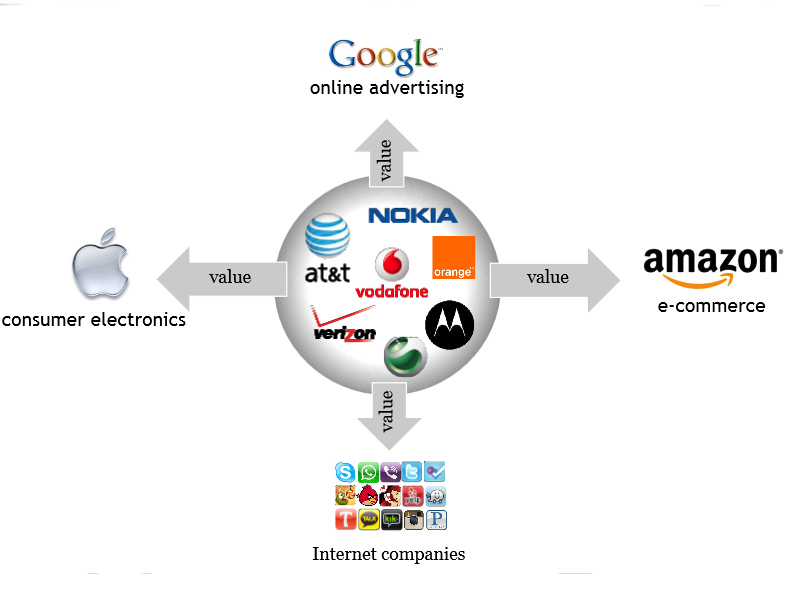GTC 2013: How Google, Apple and Amazon Disrupted Mobile
Apple drives revenue from devices whereas Google depends on advertising and Amazon depends on traffic.

During GTC 2013 in San Jose, Michael Vakulenko, Strategy Director at VisionMobile, talked about how Apple, Google and Amazon have engineered their ecosystem empires from a mobile perspective. In a way, he inadvertently backed up recent rumors surrounding Google's supposed line of X Phones, stating that Google's intent with Android is to flood the mobile market.
During his presentation, Vakulenko suggested that the mobile sector is being disrupted by asymmetric competition. In days of old, telecommunications like AT&T and Verizon were the focus, offering value to customers by providing subsidized devices from the likes of Nokia and Motorola, and premium services like SMS. But in the last several years, their value has decreased thanks to non-telecom market entities Apple, Google, Amazon, and other Internet-based services like Skype, Pandora and WhatsApp.
"It comes down to a company (destructor) removing value from the telecom value chain, and attaching this value to its core business," he said. "So while Amazon, Google and Apple are very successful in what they are doing competing asymmetrically, we see that all the legacy players – companies that used to be very successful like Nokia and Motorola – are really going nowhere. Motorola was sold and Nokia is on life support from Microsoft."
In the meantime, telecom operators are suffering, he added, because they can't really offer original services. Instead, they must be competitive in price instead, and unfortunately, it's only going to get worse from here on out.
He goes on to describe Apple's method of creating its ecosystem. It's based on premium devices like the iPhone and iPad, and offers content like apps, games, music, movies, magazines, newspapers and ebooks. Its media business alone is an $8.5 billion empire, bigger than the New York Times, Warner Bros., Simon & Schuster and Time combined.
Surprisingly, the App Sore is expensive to run. Apple CFO Peter Oppenheimer said that the company runs the store just a little over breakeven. Thus Apple not only generates revenue from hardware sales, it takes a 30-percent cut from whatever is sold in its storefront. Thus Apple's ecosystem works by first offering premium devices which attracts app developers which in turn attracts consumers. Rinse and repeat, and you have a growing iOS ecosystem.
Google doesn't take this route, generating revenue from advertisements instead. Because Android is free, device makers flock to the OS which in turn supply additional advertisement opportunities. Google Play is also expensive to maintain, yet Google can pull financial resources from other platforms like YouTube, Google Maps, Gmail and more to keep the virtual doors open.
Get instant access to breaking news, the hottest reviews, great deals and helpful tips.
Google is also out to mine information from every user, he said. This allows the company to better micro-target users directly thus increasing the value of its inventory. Mobile payments also provide even more customer-based intelligence.
That said, Google's ecosystem is fueled by advertising, not devices. The company can use revenue generated from advertisers and media sales to push the Android platform and pay the Google Play bills. The OS can be used on a wide range of devices ranging from low-end smartphones to high-end tablets to Smart TV's. At the same time, Google is dependent of device makers to make the whole thing work.
Vakulenko points out that both are now feeding off our new love of apps, thus locking developers to users. We've become accustomed to Netflix in our pocket or uploading quick shots to Facebook instantly. It's an entrenched duopoly, he said, and it won't be changing anytime soon.
Finally we have Amazon and its Kindle Fire platform which is fueled by traffic to the online retailer. Look at it this way: Amazon offered ebooks, and then decided to sell even more by cranking out its own convenient eBook reader (leading to the whole ebook conspiracy), thus driving even more traffic to the site. That idea has exploded with Kindle Fire, as consumers can sit on their couch and shop for products on Amazon whether it's an app, a physical book, a pair of shoes and more.
"Kindle Fire is a device sold at cost for the reason of getting more and more users with more and more traffic and a deeper consumer insight into the Amazon property," he said.
Vakulenko concluded his talk saying that all three ecosystems essentially depend on apps focused on gaming, cameras and socialization.
"On iOS, 33-percent of downloads and 66-percent of revenue are coming from games," he said. "Facebook is telling us that people upload 300 million pictures – probably a huge number – most of these pictures are taken by smartphones. Instagram is all about pictures and manipulating them. Twitter most of the traffic having pictures."
Naturally Nvidia's Tegra 4 SoC and later will enhance the experiences, especially on the gaming and photography side.
Kevin started taking PCs apart in the 90s when Quake was on the way and his PC lacked the required components. Since then, he’s loved all things PC-related and cool gadgets ranging from the New Nintendo 3DS to Android tablets. He is currently a contributor at Digital Trends, writing about everything from computers to how-to content on Windows and Macs to reviews of the latest laptops from HP, Dell, Lenovo, and more.
-
willard ReplyNaturally Nvidia's Tegra 4 SoC and later will enhance the experiences, especially on the gaming and photography side.
Wow, what a jarring a shameless plug. Shit like this is why I almost never read this site. Don't think I'll make the mistake again. Easy enough to fix.
echo "127.0.0.1 tomsguide.com" >> %systemroot%\system32\drivers\etc\hosts -
tenshin111 Please, remove the last sentence from the article...it is really embarrassing to sum up an otherwise interesting read with such a shameless promotion.Reply
